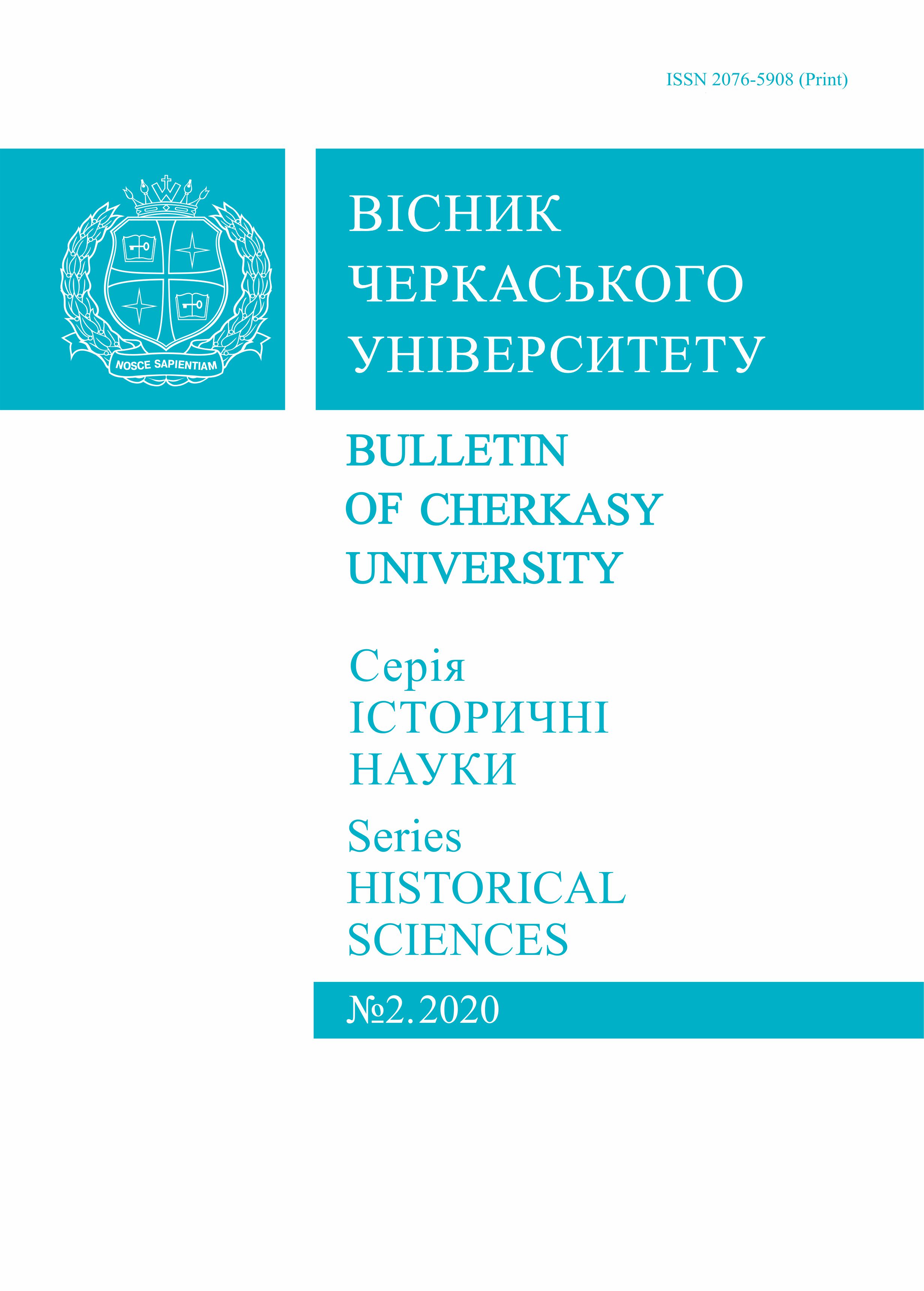Activities of the Government of the SC of the UPR in exile in the League of Nations (1920 – early 1930’s)
Main Article Content
Abstract
Abstract. Introduction. The loss of its own territory by the government of the Ukrainian National Republic and the getting the status of “government in exile” led to the restructuring of all spheres of activity, including such important ones as foreign policy. New realities forced the Foreign Ministry to look for new forms of activity, the League of Nations included, an international structure the function of which was to solve the problems that arose as a result of the creation of the Versailles-Washington system. The article considers the work of the State Center of the UNR for emigration (SC UNR) in the League of Nations and its affiliated structures. In particular, the article studies the incomplete process of accepting the UNR as a member of this organization and the reasons that prevented the full membership of the UNR in the League of Nations due to Bolshevik aggression against Ukraine.
Purpose. The aim of this article is to determine the main directions of work of the UNR emigration government in the League of Nations in the context of limited institutional, human and financial influences on international policy during this period.
Results. There has been analyzed the views of the heads of the State Center of the UNR, primarily Symon Petlura, onto the development of a new strategy of the Ukrainian emigration government in international relations. The gradual recognition of the USSR by European countries reduced their interest for the struggle of the DC UPR for the restoration of Ukraine’s independence. Therefore, it was decided that under these conditions, the activities of the UNR government abroad should be primarily informational in nature, explaining the essence of the Ukrainian state problem and possible preferences for influential or decisive factors of European policy in case of its positive solution.
A separate storyline is the attempts of the exiled government to influence the process of recognition of the Soviet Union by the United States of America. As a result of negotiations between the UNR Government factors and a group of US senators, Senator R. Copeland, the Senate of the United States began discussing the possibility of recognizing the Ukrainian National Republic.
Conclusion. Deprived of full participation in the work of the League of Nations of the UNR, in order to familiarize the world community with the position of the emigrant government, it entered in 1922, through the Ukrainian society of supporters of the League of Nations, into the International Union of society-supporters of the League of Nations, which at that time united representatives from more than 50 countries of the world. As part of the work of this Union, the Ukrainian emigration government has consistently defended its pro-Ukrainian and anti-Soviet position. It consisted in limiting the military cooperation of the USSR with other countries, protecting the population in the occupied territory from forced labor and hunger. In addition, Ukrainian society protested against the Polish policy of “pacification”.
Article Details
References
Vidnians’kyj S. (2009). League of Nations. Encyclopedia of the History of Ukraine.V.A. Smoliy (ed). Vol. 6, p. 205. Кyiv: Scientific opinion (in Ukr.).
Matviienko V. (2011). League of Nations. Political Encyclopedia. Yu. Levenets (ed.), p. 403. Kyiv: Parliamentary Publishing House (in Ukr.).
Matviienko V. (2004). Ukrainian Society of Supporters of the League of Nations. Ukrainian Diplomatic Encyclopedia. L.V. Gubersky (ed.). Vol. 2. Kyiv: Knowledge of Ukraine (in Ukr.).
Piskun V. (2006). Political choice of Ukrainian emigration (1920s) Kyiv: Lesya (in Ukr.).
Trofymovych V., & Martyniuk N. (2019). Foreign policy aspects of the emigration government of the UPR in Europe and North America (1924 - 1940). Scientific notes of the National University “Ostroh Academy”. Series “Historical Sciences”, 29, 15–24 (in Ukr.).
Livyts’kyj, M. (1984). DC UPR in exile between 1920 and 1940. Munich; Philadelphia: Ukrainian Information Bureau (in Ukr.).
International Union of Societies of the League of Nations. Ukrainian Small Encyclopedia (1961). Ye. Onats’kyj (ed), Vol. 4, book. VIII, p. 991-992 (in Ukr.).
Shul’hyn, O. (1998). Without territory. Ideology and rank of the Government of the Ukrainian People’s Republic abroad. Kyiv: Yurinkom Inter (in Ukr.).
Serhijchuk V. (2009). Ukrainian statesmen: Simon Petliura. Kyiv: PE Sergiychuk M.I. (in Ukr.)
Petliura S. (1926). Catchers of souls. Tryzub (Trident), 26-27, 4. (in Ukr.)
Petliura S. (1926). Competent recognition of Chubar. Tryzub (Trident), 31, 4. (in Ukr.)
Lytvyn S. (2018). Simon Petliura in the struggle for Independent Ukraine. Kyiv: Torch. (in Ukr.)
Lotots’kyj, O. (1936). Symon Petliura (in Ukr.).
Ukraine and the United States of North America (1929). Tryzub (Trident), 50 (206), 6-7. (in Ukr.)
Yevshans’kyj М. (1985). Action of the Central Committee of the Ukrainian People’s Republic before American factors in 1929. Svoboda (Freedom), june 26. (in Ukr.)
Response of the Ukrainian Club to Prime Minister Barlev. (1930). Dilo (Case),12, 1 (in Ukr.)
America and Ukraine. More about the introduction of Senator Copeland. (1929). Dilo (Case), 285, 1 (in Ukr.)
Yablons’kyj V. (2001). From the power of five to the dictatorship of one. Historical and political analysis of the Directory of the Ukrainian People’s Republic. Kyiv: Al’terpres (in Ukr.).
Central State archive of higher authorities and management, f. 3696, оp. 2, spr. 404, ark. 126. (in Ukr.)

